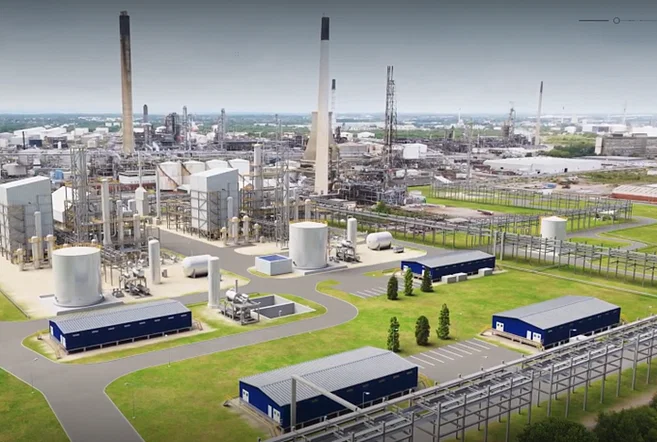Essar Energy Transition Hydrogen, formerly known as Vertex Hydrogen, has embarked on the construction of its second hydrogen plant in the United Kingdom. This ambitious project is set to make a significant contribution to the country’s transition to a low-carbon economy.
Plant Capacity
The new hydrogen facility will boast a remarkable peak power generation capacity of 1,000 megawatts and is projected to produce a staggering 230,000 tonnes of low-carbon hydrogen annually, firmly positioning itself as not only the largest hydrogen plant in the UK but also one of the largest globally. Its construction will be executed in phases, with the first phase anticipated to conclude within the next seven to eight months. The plant’s far-reaching impact extends beyond its sheer size; it is poised to catalyze investments across the UK’s North-West region. This will include the development of crucial infrastructure for transporting and storing hydrogen, as well as encouraging industrial and power generation customers to transition to this environmentally friendly fuel source. The total investment for both this second plant and the previously completed 350 MW first plant is estimated to be around £1 billion.
Moreover, the hydrogen produced by this plant will facilitate groundbreaking developments, marking the advent of low-carbon refining, glass, and chemical manufacturing sites worldwide. The strategic location of HPP2, adjacent to the HPP1 plant, will capitalize on synergies and ensure cost-effectiveness.
Also read: The Netherlands to build the world’s largest offshore hydrogen production plant
Deepak Maheshwari, CEO of Essar Oil U.K., expressed enthusiasm for the company’s role as an anchor customer for the EET Hydrogen business, emphasizing their commitment to deploying innovative hydrogen use cases and decarbonizing their operations and manufacturing processes.
The first project, HPP1, completed front-end engineering and design in September 2021 and was subsequently selected by the government in March 2023 as one of two initial large low-carbon hydrogen plants in the UK.
Hydrogen, a clean and versatile energy source, can be produced through various methods, including water electrolysis. Its applications span transportation, heating, and energy storage, making it a pivotal component of the UK’s transition to a sustainable energy landscape.
The commencement of Front End Engineering & Design (FEED) for this second hydrogen plant represents a pivotal step in the UK’s endeavor to decarbonize the energy sector. By reducing greenhouse gas emissions, it aligns with the nation’s ambitious goal of achieving net-zero emissions by 2050.
While the precise capacity of the second hydrogen plant is yet to be disclosed, it will join Essar’s first hydrogen plant in Stanlow, Cheshire, which was commissioned in 2021. The new facility, situated at an undisclosed location, will leverage the knowledge and experience gained at the Stanlow site, incorporating cutting-edge technology to ensure efficient and sustainable hydrogen production.
Essar Energy Transition is unwavering in its commitment to investing in renewable energy projects and fostering energy transition. The company recognizes the pivotal role of hydrogen in the clean energy landscape and aspires to contribute to the development of a hydrogen economy not only in the UK but on a global scale.
This project closely aligns with the UK Government’s proactive stance on hydrogen investments and the expansion of the country’s hydrogen infrastructure. It also underscores the global imperative to reduce carbon emissions and combat climate change.
The commencement of Front End Engineering & Design (FEED) on the HPP2 production project for Essar Energy Transition’s second hydrogen plant in the UK represents a momentous milestone in the nation’s transition to a low-carbon economy. The plant’s potential to reduce greenhouse gas emissions and facilitate the achievement of the UK’s zero-emissions objectives underscores its pivotal role in advancing the energy transition and shaping a sustainable future.

